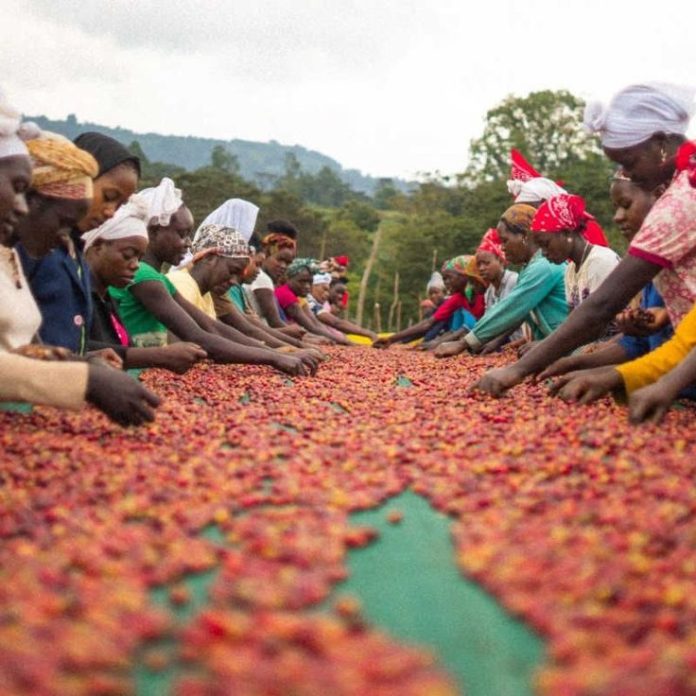Ethiopia’s coffee sector began the 2025/26 fiscal year on an impressive note, earning USD 762.75 million in the first three months alone; a 47 percent increase compared with the same period last year. The figures, released by the Ethiopian Coffee and Tea Authority (ECTA) this October, reveal that despite exporting only 113,542 tons of coffee, about three-quarters of its planned volume, the country exceeded its revenue target by 23 percent, powered by stronger global prices and a shift toward high-value specialty beans.
Coffee remains Ethiopia’s most important export commodity, a livelihood source for more than five million smallholder farmers and the backbone of rural economies across Oromia, Sidama, and the Southern Nations region. The first-quarter results underline both the resilience and evolving sophistication of the country’s coffee trade, which continues to gain ground in value even when volumes fluctuate.

Germany remained the top buyer, importing 20,793 tons worth USD 138 million, followed by Saudi Arabia and Belgium, with combined purchases exceeding a quarter of total exports.
China, the United States, South Korea, the United Arab Emirates, Japan, Italy, and Russia completed the top ten destinations, together accounting for roughly 80 percent of export earnings.
The steady expansion of Ethiopia’s customer base across Europe, the Gulf, and East Asia shows how trade diversification is gradually reshaping the country’s export profile.
Read also: OPEC fund commits $31 million to boost energy and food security in Chad
The surge in coffee earnings is part of a broader export revival. During the first quarter of the fiscal year, which began in early July, Ethiopia’s total export revenue reached USD 2.48 billion, up 117 percent year-on-year, according to the Ministry of Trade and Regional Integration. The ministry reported that it had achieved 117 percent of its quarterly target, placing the country firmly on track to meet its USD 9.4 billion annual export goal.
Trade Minister Kassahun Gofe credited the performance to macroeconomic reforms, policy consistency, and a recovery in global demand. President Taye Atske Selassie, speaking in a national broadcast, said the government aims to sustain growth at around nine percent by reinforcing fiscal stability and expanding output across strategic sectors. For a country where exports have historically lagged behind import demand, the figures suggest a decisive turn.
Behind the statistics lies a combination of structural adjustments and pragmatic trade diplomacy. Ethiopia has pursued a mix of fiscal reforms, partial currency liberalization, and institutional strengthening to improve export competitiveness.
The government has also emphasized value addition, encouraging local processing of coffee and oilseeds, introducing new quality-grading systems, and attracting investment into modern roasting and packaging facilities. These measures have begun to shift Ethiopia from a commodity exporter toward a value-chain participant, capable of retaining a greater share of profits within its borders.
The coffee sector itself has weathered considerable external pressures. Earlier this year, the United States imposed a 10 percent tariff on Ethiopian coffee, a policy that initially raised fears of lost market share. Yet exporters quickly diversified, expanding shipments to Germany, Saudi Arabia, Belgium, and China.
This adaptability underscores a maturing export system that is no longer dependent on a single market. With global demand for specialty and traceable coffee rising, retailing at premiums of 15 to 30 percent above standard grades, Ethiopia’s heritage varieties such as Yirgacheffe and Sidamo continue to command strong prices.
Read also: Morocco charts 2040 Coal exit in bold move towards Africa’s green energy future
The broader export momentum also coincides with three policy milestones that could reshape Ethiopia’s trade landscape. The first is the operational rollout of trade under the African Continental Free Trade Area (AfCFTA). On October 9, 2025, Ethiopia shipped its first consignments of vegetables, fruits, khat, maize, beans, and coffee to regional partners including Kenya, South Africa, and Somalia.
Additional exports to Nigeria, Tanzania, Uganda, and Malawi are expected in the coming quarters. By participating actively in AfCFTA, Ethiopia is signaling its intent to anchor export growth within Africa, not only through traditional partners in Europe or Asia.
The second milestone is the renewed push toward World Trade Organization (WTO) accession, which officials say will improve transparency, harmonize tariffs, and attract foreign direct investment into manufacturing. The third is a new round of domestic export-financing reforms designed to address long-standing foreign exchange shortages, a critical bottleneck for businesses seeking to scale up production for export.
Analysts view these reforms as complementary to Ethiopia’s industrial ambitions. The government’s ten-year perspective plan envisions a structural shift in the export mix, with value-added manufacturing, including textiles, leather, and agro-processing, accounting for at least 20 percent of total exports by 2030. The strong coffee performance offers a financial cushion for this transition, generating foreign exchange to import machinery, support logistics, and stabilize the birr.
Sustaining growth will still require steady progress on infrastructure and climate resilience. Logistics costs in Ethiopia remain among the highest in Sub-Saharan Africa, absorbing up to 30 percent of export value for inland producers. Meanwhile, coffee production faces increasing exposure to erratic rainfall and rising temperatures.
Studies by the International Center for Tropical Agriculture (CIAT) estimate that without adaptive measures, up to 40 percent of Ethiopia’s current coffee-growing areas could become unsuitable by mid-century. The government is therefore expanding irrigation, shade-tree planting, and climate-resilient seed programs to safeguard yields.
The success of Ethiopia’s coffee sector this fiscal year provides both immediate and long-term significance. In the short term, the surge in earnings strengthens foreign reserves, stabilizes inflation, and boosts confidence among investors watching the rollout of the new Ethiopian Capital Market Authority. Over the longer term, it reinforces the logic of diversification, that trade grounded in quality, regional integration, and sustainability can deliver consistent gains even amid global volatility.
Read also: Ghana and China plan to seal zero-tariff trade deal as Accra eyes export-led growth
If Ethiopia maintains this pace through the rest of the fiscal year, it could post its strongest export results in more than a decade, giving the economy breathing room to consolidate reforms and expand its manufacturing base. More importantly, it would reaffirm the country’s role as Africa’s coffee powerhouse, not only as a grower of beans, but as a model of how agricultural heritage, policy discipline, and market innovation can work together to sustain economic transformation.






